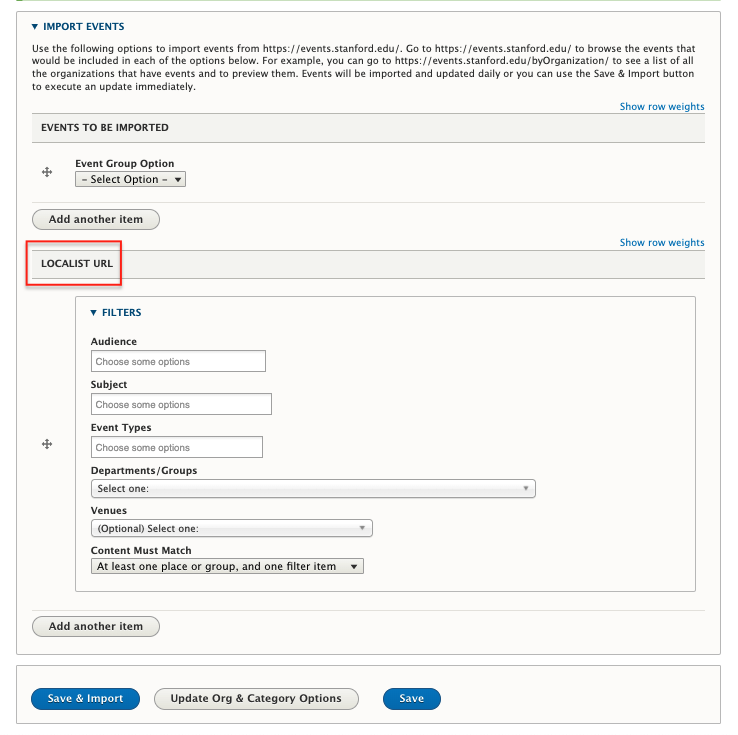Import events from the Stanford Events calendar
The Events Importer takes information from the Stanford Events Calendar and populates the Event Content Type on your site. You can rely on it for all of the events displayed on your site or you can combine these events with ones you list only on your site.
You can import Events based on an organization, audience group, event subject, as well as by event type on the Stanford Event Calendar.
Once the importer has been created, Events will be imported and updated automatically daily. If you want to import Events immediately, you can use the Save & Import button (found within the Events Importer editor).
Import Events
When you import events from Stanford Events Calendar your site creates event nodes and allows you to display these events on your site.
- From your site’s admin menu select Configuration > Importers > Events Importer
- Scroll down to the Localist URL section to import Events from the Stanford Events Calendar.
- Add filters to import Events based on Audience, Subject, Event Types, Departments/Groups and/or Venues.

- Once you are satisfied with your import selections, scroll to the bottom of the page and select either:
- Save & Import: Saves your selections and executes an import update immediately
- If you selected Save & Import you should see a message about the number of Events imported.
- Save: Saves your selections, but executes an import during daily import
- To see the imported Events, from your site’s admin menu go to All Content and filter by the Event content type.
Events are imported and updated daily. To execute an immediate update, select Save & Import.
Troubleshooting
If a department or group is not showing as expected, click Update Org & Category Options to refresh with the latest list of Departments/Groups and Categories from Localist.
What will be imported?
The importer pulls Events from Stanford Events Calendar into your Drupal site so that content becomes part of your content library. You can display or reuse the Event content within your site. The Event Importer will import the following fields:
- Event Type
- Event Title
- Body Content (from the Localist Description field)
- Date & Time (Start Time and End Time)
- Note: If there isn't an End Time in Localist, the importer sets the End Time to match the Start Time. Only the Start Time will be displayed on the Event.
- Event Place
- Audience
- Link to view the event on Stanford Events Calendar
Note that by default, imported Events will link to the Event on Stanford Events. If you want to display the Event on your site instead, edit the External Source field to remove the URL.
Also, note that Events remain editable on Localist. When you update an Event on Localist, it will be re-imported the next time the importer runs, and will update the existing Event node on your site. However, this only works one way: if you update an Event node on your website, it will not push the update to Localist.
Questions about using the Events Importer? Submit a Help Request.
More on the Events Importer
How do you stop importing Events?
To stop importing Events, remove the criteria from each field item on the Events Importer configuration page. When you save it, the Events Importer will be removed.
- Navigate to Configuration > Importers > Events Importer configuration page
- Remove the criteria from each field.
- Scroll to the bottom of the page and click Save
How do you delete all the Events from an Events Importer?
You delete imported Events in the same way you that you remove content from Stanford Sites. You can use a bulk editing function or remove Events one at a time.
How do you display only the Events from a specific event importer?
You can't display Events from only one, specific importer. Once Events are imported, they’re handled like regular Drupal content. It is possible to manually specify and display Events by Event Type after they have been imported.
How do you import a bookmarking/custom feed?
Bookmarking allows Event admins to add Events hosted by other departments to their own department’s XML feed for import into their own website. To create your custom feed and bookmark your Events, go to the Bookmarking / Add to custom feed page on the Events Help site at: https://events-help.stanford.edu/connections/bookmarking-add-to-custom-field/
Once you have your custom feed, you can add the URL to the Localist Bookmarked Events section on the Events Importer configuration page.
- Navigate to Configuration > Importers > Events Importer configuration page
- Scroll down to the Localist Bookmarked Events section
- Paste the URL from your custom feed
- Scroll to the bottom of the page and click Save

Redirects
Once an Event is imported, it has a redirect that points back to the Event page on Stanford Events Calendar.
Troubleshooting
I get an error saying "Could not find the stanford_events_importer migration!"
Scroll to the bottom and click Save instead of Save & Import. Clicking Save processes your selections, but executes an import during daily import.
An Event previously added has been removed from Stanford Events (Localist), but the imported page remains on my site showing as a 404 error
In these cases, you will have to delete the Event on the site manually as these Events will not be automatically deleted. The system will only return future Events but will not know if an Event was deleted or has just occurred.
I changed an event after it occurred but it doesn't update on my site.
After an event occurs, the Drupal Importer will flag that event as "ignored" to save on processing time in subsequent imports. This will prevent the event from being updated regardless of what changes are applied, even if the date was changed/added to a future occurrence.
Related Topics

Event Taxonomy
Your site comes with two taxonomy vocabularies associated with Events. These vocabularies include a number of useful terms that and site managers can leverage.